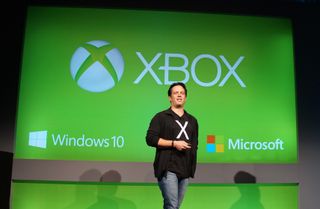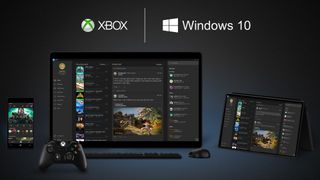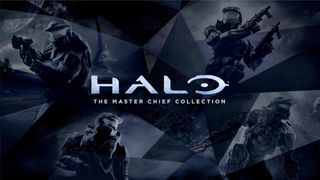Phil Spencer: "We ignored what was going on with Windows" to launch Xbox

At GDC, head of Xbox Phil Spencer gave a talk about what Microsoft has in store for gaming on Windows 10, touching on DirectX 12, the Xbox Live app for windows, and the ID@Xbox indie game initiative. His talk included a few announcements: Microsoft is finally working on a PC dongle for the Xbox One wireless controller, and a new Windows 10 universal app store will support cross-platform play (and cross-buy!) between PC and Xbox One.
During his talk, Spencer openly admitted that Microsoft had lost its way when it came to PC gaming, and he's trying to put it back on track. After the presentation, I had a chance to talk for a few minutes about Microsoft's renewed interest in PC gaming and what that means for Windows 10.
Phil Spencer: For us, we think about all that a game developer thinks about, whether developing for either Windows or console, and how do we make more commonality for them rather than less, so they can really think about what their game is, what their engagement loop is, how they want to sell their game, how they want to monetize their game. For us, thinking about all steps of it, and input, the dongle is if you want to be controller based, we want to make it easy so you don't have to think about what controller you'll use on PC. They already own the Xbox controller, so they can just move back and forth with it. Same controller. From a consumer standpoint it's great. My controller now works on another device. I think that's cool.
Same thing with the DirectX work and Xbox Live work and the universal app work. It's really trying to create a single platform that developers can adopt, that allows them to reach the broadest set of customers possible.
PCG: I think that's happening even outside of Microsoft too. Great things like Unity, for example, has made it so easy for people to port. And I think the fact that the consoles are now x86...I think that's all good stuff, and I'm glad to see that's a big part of Windows 10.
Spencer: I want to embrace it, and for the Xbox community, which is obviously critical for me and us as a company, it's really just going to turn into more content that they get to play. Because the indies that are already on PC, if they're building for Windows 10, they're kinda eight, nine steps of the way towards delivering on Xbox One anyway. So it's basically just another endpoint they'd want to deliver to. As an Xbox owner, I want to be able to play as many games as I can. That's where the ID community, I wanted to bring them on stage and hear the indie community talk about the opportunities. The easier we can make it for them to move their content back and forth, the better.
PCG: I'm curious how easy the porting process is now, with the versions of Windows the Xbox runs and Windows 8, and what's changing to make that more possible with Windows 10. I know Windows 10 is coming to the Xbox eventually. Is it primarily DirectX?
The biggest gaming news, reviews and hardware deals
Keep up to date with the most important stories and the best deals, as picked by the PC Gamer team.
Spencer: No, Xbox Live is a big part of it. Today, if you're on Windows 8, you don't have the Xbox Live API that you can call. There's some services that are available for web, but we don't have the full API set. So if you're building a game and you say I want to adopt a multiplayer system, and I want to be able to use that same multiplayer system across Xbox and PC, now you're going to have Xbox Live. Today we launched the Xbox Live SDK on Windows to a select set of partners. We'll learn how they've been building it out. Obviously #IDARB's one of those.
So DirectX, Xbox Live, and then this universal app platform is really a platform that thinks about the fact that this core set of code is going to land on multiple devices. You call it porting, but I don't want people to think about it as porting. I want people to think about the core EXE itself and the distribution of that EXE through the store, understands that I've got a package that might land on a phone, might land on a laptop, might land on a console, and the store mechanic through the universal developer portal and the deployment and entitlement is the thing that manages the code that you actually end up with as a consumer. And I just think I'm playing #IDARB. So I don't have two versions of #IDARB sitting in a store. I literally have one version, and I buy it for the Xbox, I get the right set of input and display templates, if you want to call them that, to fit this display environment versus a PC. Or if they're exactly the same, they're exactly the same. And really the developer is managing one deployment, which is easier for them.

PCG: The universal app store brought to mind, for me, the Windows 8 app store, which got you guys in some hot water a couple years ago. A lot of gamers freaked out at the initial prospect that everything was going to have to go through that store. That they wouldn't be able to use Steam anymore. That's not how it panned out, but I know there's still some sensitivity.
Spencer: That's why I showed Steam in January. I wanted to show that Steam is going to work on Windows 10. My Steam games that I own now on Windows 8 will be there when I go to Windows 10. I think it's critical that we don't have that plan. Windows is a platform that developers deploy to. We know that. I think that's great. That's how things like Minecraft were born.
PCG: So for games like #IDARB for example, or Pinball FX which is going to have cross-buy, would those games be able to be on Steam?
Spencer: Sure, they can put their games on Steam.
PCG: So the universal app stuff, cross-platform play, cross-buy, would still work side-by-side with Steam?
Spencer: I don't want to announce Steam features, because there's obviously policy and things that they have. Just like Apple does and everybody else. There's nothing bad about Steam and how they sell their games. I think we should wait until we have a formal [statement of] 'hey what does Steam want?' They've heard our plans because we've been talking to them about them. But in terms of what they're going to allow on their store, I think that's a question you'd ask of them.
We're not trying to say that the only way you'll get games is through the Windows store. Does Steam want to sell Xbox Live games? That's a question for them. Do they want to sell universal app Windows 10 games? Again, I think it's something we'll have to work with them on, and other stores that are out there. But we want to make sure that built into the operating system with the Windows store, there is a store that developers like Other Ocean, they're small, they want to develop their game as easily as they can, reach the broadest set of customers possible. We're trying to give them a mechanism, if you're an Xbox Live DirectX universal app, it's going to be very easy to reach multiple [platforms].
And not everyone will choose to be universal apps. I just want to make it as easy as possible. But it's not to shut down Steam. I think Steam will exist for many many years.
PCG: It'd be a challenge to shut down Steam.
Spencer: I don't want it! They're an important component of Windows gaming. We're trying to offer—I could say offer choice, but I don't even mean that as in 'a choice away from something else.' We want to make it easy for developers that are focusing on console and Windows to deploy in both places. There are some advantages for the PC-only people, and there's some advantages for the Xbox-only people as well.
PCG: In your talk you mentioned that at some point in the past few years, maybe with Windows 8, Microsoft lost gaming as a core tenet of Windows, and that's something you've been trying to bring back. I imagine as you've been doing Xbox stuff for the past year, and you identified that as an issue, can you tell me some of the core things you identified as places you went wrong, and specific examples of what you did to rectify them?
Spencer: I think the easiest way to talk about that history is the amount of focus it took for the company to enter the console space. Way back in the day, 2000, we announced the original Xbox. We had no business being in the console space. You had Sega, you had Nintendo, you had Sony with the PS2 which was ridiculously successful. And then we had the Windows 95 team with blue screens of death and all that, and here we come building a game console. The team, we set a dedicated set of people off, kind of on their own. I call them the garage band. And they said, let's try to gain relevance in this console space. And I applaud the work that the whole team has done. Xbox is now a gaming brand, whereas when we announced it, it was, 'what is that thing?'
That amount of focus was almost required to land where we are with Xbox today. What it meant, though, was that distraction, we did ignore what was going on with Windows. Other people like Steam came in and offered some very valuable services. What's really the impetus for me now is what our customers are saying and doing. Our customers play games on all of their devices. When I'm connected to my Xbox community on console and then I go to PC and lose that community—people want to stay connected wherever they are. The kickback has been more from what customers are saying.
Inside the company, you just see the importance of gaming, when you look at the engagement and monetization that happens on all of these devices, and gaming is right at the top. It's not a hard sell to say if you're going to sell a phone, if you're going to sell a tablet, gaming is critical to that.

PCG: Even though it's off my beat as a journalist, I feel like I have to ask a little about MCC and what happened with that. As someone who bought the game, and has been observing it, it's hard to believe that nobody knew it was as broken as it's proved to be before launch. And now it's taken months and months of patches and it's better, for sure, but it's still clearly in rough shape. What happened for that launch to go so long?
Spencer: Going into the launch we had done our normal amount of testing and simulation on what the real world environment is like. When you say what happened, there are a few parts to it. Master Chief's not one game. It's four games that were developed by a lot of different studios, and we were trying to knit together a multiplayer system that seamlessly worked across all these different code bases of how they do multiplayer. Nobody should shed a tear for us because our job is hard. But it's harder than making Halo 4 or Halo 5 multiplayer work on its own, as a system that spans across all the games.
At the same time we're still at the beginning of the new Xbox Live on XBox One. Not only were we unifying all these games, we were moving them all to this Live system that's on Xbox One. It's different, it's an evolution of what was one 360. Still, our testing said that now was the time to launch, and that the game—you always learn something when you launch—but that the game was ready. And certainly from the feedback from certain people in the community, we didn't meet their expectations.
That was [us learning]. What you've seen us do since that, we're doing very early betas, like the Halo 5 beta very early, so we learn and test our multiplayer environments. Fable's going through a long beta program. We're starting to use our Xbox preview community to help us with games as well. It's hard to simulate the real world with people with different NATs and the complexity and randomness that's out in the real world.
343 has stayed on the content updates, we launched content update 13 yesterday. I don't know what your community is saying, but we're seeing pretty good feedback from the results there. But we're not standing up and beating our chest. We feel like we're doing what we should've done. But the learning both from how we run our studios and how we run our process, it'll make us better, and I know that's probably not going to make anybody feel great about it. And Halo is critically important. And there is a CU 14. On the 343 side they remain committed to the Halo nation, because they live and breathe with those people. That's their lifeblood. And they know Master Chief didn't hit the expectation that people wanted.
PCG: Once it's all fixed up, any chance we'll see on PC?
Spencer: It's a good question. I want—well, through the streaming, obviously people will be able to play on their PCs in their home. And bringing more and more of the right genres to PC, I think is clearly in our future. But we don't have anything with Master Chief...I think it's sacrilege to talk about doing anything with Master Chief now other than making the experience better on Xbox One.

Wes has been covering games and hardware for more than 10 years, first at tech sites like The Wirecutter and Tested before joining the PC Gamer team in 2014. Wes plays a little bit of everything, but he'll always jump at the chance to cover emulation and Japanese games.
When he's not obsessively optimizing and re-optimizing a tangle of conveyor belts in Satisfactory (it's really becoming a problem), he's probably playing a 20-year-old Final Fantasy or some opaque ASCII roguelike. With a focus on writing and editing features, he seeks out personal stories and in-depth histories from the corners of PC gaming and its niche communities. 50% pizza by volume (deep dish, to be specific).
Most Popular

